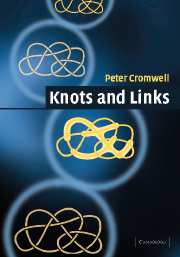Book contents
- Frontmatter
- Contents
- Preface
- Notation
- 1 Introduction
- 2 A Topologist's Toolkit
- 3 Link Diagrams
- 4 Constructions and Decompositions of Links
- 5 Spanning Surfaces and Genus
- 6 Matrix Invariants
- 7 The Alexander–Conway Polynomial
- 8 Rational Tangles
- 9 More Polynomials
- 10 Closed Braids and Arc Presentations
- Appendix A Knot Diagrams
- Appendix B Numerical Invariants
- Appendix C Properties
- Appendix D Polynomials
- Appendix E Polygon Coordinates
- Appendix F Family Properties
- Bibliography
- Index
4 - Constructions and Decompositions of Links
Published online by Cambridge University Press: 05 June 2012
- Frontmatter
- Contents
- Preface
- Notation
- 1 Introduction
- 2 A Topologist's Toolkit
- 3 Link Diagrams
- 4 Constructions and Decompositions of Links
- 5 Spanning Surfaces and Genus
- 6 Matrix Invariants
- 7 The Alexander–Conway Polynomial
- 8 Rational Tangles
- 9 More Polynomials
- 10 Closed Braids and Arc Presentations
- Appendix A Knot Diagrams
- Appendix B Numerical Invariants
- Appendix C Properties
- Appendix D Polynomials
- Appendix E Polygon Coordinates
- Appendix F Family Properties
- Bibliography
- Index
Summary
In this chapter we look at some techniques for breaking up links into simpler pieces. These pieces may be complete links, or link fragments known as tangles. When the pieces are also links, the decomposition process can be reversed to give a method for generating new links from given ones.
The primary tool for decomposing links is to embed surfaces in the link exterior. Here we shall explore decompositions using closed surfaces (spheres and tori) and also annuli and other punctured spheres.
Unions of links
The simplest, if somewhat trivial, decomposition of a link is that of distant union or splittability – the components can be totally disentangled from one another and put on separate planets.
Definition 4.1.1 (split link). A link L is split if there is a 2-sphere S embedded in the link complement ℝ3 − L so that there are some components of L on each side of S. If we denote the two components of ℝ3 − S by U1 and U2 and let Li = Ui ∩ L then we write L = L1 ⊔ L2 and say that L1 and L2 are the split components of L.
Conversely, given the two links L1 and L2 we can construct L by placing them in disjoint balls in ℝ3. In this case we say that L is formed as the distant union of L1 and L2.
We often restrict attention to non-split links.
Information
- Type
- Chapter
- Information
- Knots and Links , pp. 78 - 101Publisher: Cambridge University PressPrint publication year: 2004
